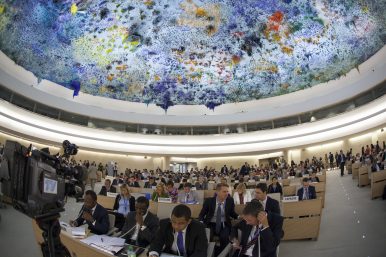Sri Lanka: Back in the Spotlight at the Human Rights Council
Colombo’s performance comes under heightened scrutiny.

 By Taylor Dibbert-March 03, 2017
By Taylor Dibbert-March 03, 2017 The 34th session of the UN Human Rights Council (HRC) began on February 27, with Sri Lanka on the HRC’s formal agenda. The nation’s compliance with an October 2015 HRC resolution will come under heightened scrutiny during this session and a new resolution on Sri Lanka is expected to be passed (something Colombo apparently would support).
The 34th session of the UN Human Rights Council (HRC) began on February 27, with Sri Lanka on the HRC’s formal agenda. The nation’s compliance with an October 2015 HRC resolution will come under heightened scrutiny during this session and a new resolution on Sri Lanka is expected to be passed (something Colombo apparently would support).
The island nation’s foreign minister, Mangala Samaraweera, delivered a predictable speech at the Geneva-based body on February 28. One of the main problems, as usual, with Samaraweera’s proclamations is that we can hardly assume that the tone and substance of the speech truly reflect the views of the country’s political leadership or what it plans to do in the coming months.
This is a rather tricky session for various reasons. Colombo remains ostensibly committed to its transitional justice agenda, but so little of the previous resolution has been implemented. None of the four proposed transitional justice mechanisms are operational and many other aspects of the resolution have been largely ignored.
One thing to look out for will be to see in what ways a forthcoming resolution deviates from the previous one. In addition, will the UN High Commissioner for Human Rights deliver (justifiably) hard-hitting observations? Or might he seek to frame Sri Lanka’s lack of compliance in a more careful way? An interactive dialogue on Sri Lanka is scheduled for March 22 and the session ends on March 24.However, if another resolution isn’t passed this time around, there are legitimate worries that it’d be that much easier for rights and justice issues in Sri Lanka to fall off the international community’s radar, which would conceivably make continued prevarication from Colombo more likely.
We’ll know more soon.
